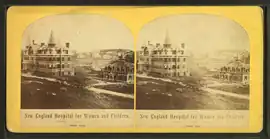Stefania Berlinerblau
Stefania Berlinerblau or Fanny Berlin (1852 – September 4, 1921) was an American anatomist and physician. She is noted for her investigations on blood circulation, which led to the demonstration of the artery-vein connections.[1] She is also considered a pioneer in pushing for the recognition of women in the medical field.[2] She was one of the first Jewish women who practiced surgery in the United States[3] and was a co-founder of the New England Women's Medical Society, seven years before the acceptance of women into the Massachusetts Medical Society.[1]
Stefania Berlinerblau | |
|---|---|
| Born | 1852 |
| Died | September 4, 1921 (aged 68–69) Boston, Massachusetts, U.S. |
| Occupation | Physician |
Early life and education
Berlinerblau was born in 1852 in Kherson, Kherson Governorate, Russian Empire (currently Ukraine).[3][4] She was the daughter of Markus Berlinerblau. At a young age, her ambition was to become a physician.[3] After she completed her gymnasium education, she persuaded her parents to let her study medicine in Switzerland.[1] Together with a friend, she became part of a colony of Russian medical students who were enrolled at the University of Zurich.[3] An account cited that during this period, Berlinerblau was a strong sympathizer of Prince Pyotr Kropotkin, Sergey Stepnyak-Kravchinskii, and other Russian revolutionaries.[1] For her revolutionary activities, spirited personality, and nihilist view, she was identified as one of the Kosakenpferdchen or "Cossack ponies".[1] This group's appearance and politics had been described as "frightfully revolutionary", prompting German newspapers to warn women from associating with these students.[5] In 1873, Tsar Alexander II banned women from studying in Zurich forcing her to transfer to Berlin where she completed her medical training.[6]
To obtain her medical degree at the Bern Institute of Anatomy, she completed her dissertation on the blood circulation in mammals under the guidance of Christoph Theodor Aeby.[1] Her method involved the tracing of the substances' movements from arteries to veins using dyes, which ultimately led to a demonstration of the artery-vein connections.[1] She completed her degree in 1875, the same year she published her work on blood circulation in the journal Archiv für Anatomi und Physiologie.[1]
Career

By 1877, Berlinerblau had relocated to Boston for her residency at the New England Hospital for Women and Children.[2] When she assumed her residency, she changed her name from Berlinerblau to Berlin and was published in several newspapers in the city.[7] She was appointed to a visiting physician position in 1879.[8] The institution was the only hospital that accepted female physicians in Boston.[3] Berlinerblau was one of the four female surgeons in the hospital, which was administered by Dr. Marie Zakrzewska,[3] who was also an immigrant from Berlin.[5] This group of physicians, which included Elizabeth Keller and Mary Smith, also constituted the hospital's board of physicians, driving the institution's direction and growth for over twenty years.[8]
By 1881, Berlinerblau had become a noted surgeon known for performing laparotomies.[3] She also served as the New England Hospital's chief surgeon until 1894.[9][10] She established a private practice after she resigned,[10] finally retiring in 1916 due to failing eyesight.[1]
As a woman, Berlinerblau was barred from joining the Massachusetts Medical Society.[10] Due to this restriction, she founded the New England Women's Medical Society in 1878 together with nine other women surgeons.[1]
Berlinerblau's published works included a paper in the American Journal of Obstetrics in which she described her surgical methods.[1] This publication, entitled Three Cases of Complete Prolapsus Uteri Operated upon According to the Method of Léon Le Fort, detailed her successful surgical correction of uterine prolapse.[1]
Berlinerblau died on September 4, 1921, at her home in Boston's Roxbury district.[1]
Publications
- Three Cases of Complete Prolapsus Uteri Operated upon According to the Method of Leon Le Fort (1878)
- A Case of Supposed Extra-Uterine Pregnancy Treated by Electricity (1884)
- A Case of Ante-Uterine Hematocele Laparatomy Recovery (1889)
- A Case of Tubal Pregnancy (1893)
References
- Creese, Mary R. S. (2015). Ladies in the Laboratory IV: Imperial Russia's Women in Science, 1800–1900: A Survey of Their Contributions to Research. Lanham, MD: Rowman & Littlefield. pp. 23–24, 44. ISBN 978-1-4422-4741-3.
- Marcus, Jacob Rader. "United States Jewry 1776-1985". digital.library.wayne.edu. Retrieved October 9, 2020.
- Chasin, Judith (February 27, 2009). "Fanny Berlin". Jewish Women's Archive. Retrieved October 8, 2020.
- Diner, Hasia; Diner, Professor Hasia; Benderly, Beryl (2002). Her Works Praise Her: A History of Jewish Women in America from Colonial Times to the Present. Basic Books. p. 97. ISBN 978-0-465-01711-9.
- Furst, Lilian R. (1997). Women Healers and Physicians: Climbing a Long Hill. Lexington: University Press of Kentucky. p. 174. ISBN 978-0-8131-2011-9.
- "Female Medical College & Homeopathic Medical College of Pennsylvania Presented by Sylvain Cazalet". homeoint.org. Retrieved October 8, 2020.
- Children, New England Hospital for Women and (1899). History of the New England Hospital for Women and Children. Boston: George H. Ellis. p. 28.
- Drachman, Virginia (1984). Hospital with a Heart: Women Doctors and the Paradox of Separatism at the New England Hospital, 1862-1969. London: Cornell University Press. p. 107. ISBN 978-0-8014-1624-8.
- Bonner, Thomas Neville (1992). To the Ends of the Earth: Women's Search for Education in Medicine. Cambridge, MA: Harvard University Press. p. 65. ISBN 978-0-674-89303-0.
- "Fanny Berlin". Jewish Women's Archive. Retrieved October 13, 2020.